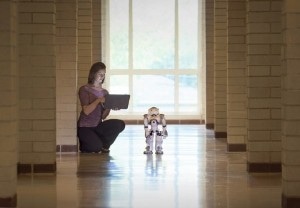Sep 26 2017
Courtney Owen, when she was a student in high school, started thinking about how robots could help humans. She met Zeno, a robot capable of helping children with autism improve their social communication, while working a summer job in a research lab in Fort Worth, Texas.
 Photo Courtesy: Wayne Armstrong, University of Denver
Photo Courtesy: Wayne Armstrong, University of Denver
Owen was excited and surprised to encounter Zeno again as a first-year Student at DU. Mohammad Mahoor, the Associate Professor of Electrical Engineering who works with Zeno, was introduced in a video shown at a dinner during orientation week. She swiftly reached out to Mahoor and started working in his lab that year.
“I’ve been interested in the intersection of robotics and human interactions — also known as socially assisted robotics — for a long time,” says Owen, presently a junior. While in Mahoor’s lab, she worked on Zeno’s programming and also started to construct a chatbot — a computer program that has been designed for simulating conversation with human users.
Ultimately, that work resulted in her designing her own research project in order to develop the code for a dialogue-management system that could allow a robot or a computer application talk to elderly people. Eventually, she hopes the system will help older people get the social interaction they require — particularly those who are hesitant to talk to a Mental Health Professional.
She worked on the project in summer 2017 by receiving funds from a DU summer research grant. The grant provided her with living expenses such that she can devote her summer to intensive, full-time research. Awarded by DU’s Undergraduate Research Center, summer research grants provide Students with up to $3,500 each in order to support their work and also to cover expenses. This year, 45 Students received grants in 11 different disciplines ranging from Physics to Art and Astronomy.
With this grant, the only constraints were time and my own abilities.
Courtney Owen, Student, University of Denver
A person interacts with the chatbot via a series of yes/no questions and questions with restricted responses. “First the chatbot introduces itself, and then it takes you through a PHQ-9 test, which is a depression indicator test,” Owen says. From there, Owen included questions and guidance suggested by Mental Health Counselors.
The chatbot is considered to be the first step in what Owen hopes will become a bigger project accessible to a wider audience.
Once I finish this prototype, I will use a website that allows you to enhance your chatbot using artificial intelligence.
Courtney Owen, Student, University of Denver
Owen can program a computer, or even a robot, when the code for the prototype chatbot is complete, in order to interact with an elderly user.
At the end of the summer, Owen met with Professor Alison Darcy from Stanford University in order to discuss a program Darcy designed called Woebot that is similar to her own. Darcy and Owen conversed about the different audiences that could benefit from Woebot. “She wants to change Woebot to make it more tailored for elderly people, which is the group I have been focusing on for my project,” Owen says.
Owen explains that her summer research experience has left her feeling equipped for her future.
Being able to conduct research has really shown me what being an engineer can be like. After having created a basic prototype that I will continue to build upon, I feel much more confident in my abilities to tackle any problem that comes my way, be it in a future class or my future career.
Courtney Owen, Student, University of Denver